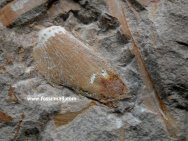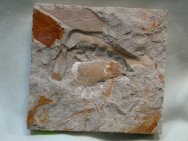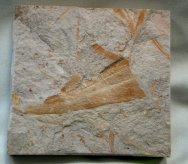Squamella
australis
Glossopteris ampla
Geological
Time: Late Permian
Size (25.4
mm = 1 inch): Squamella: 29 mm by 15 mm Glossopteris (on reverse) 58 mm
by 18 mm Matrix: 75 mm x 70 mm
Fossil Site:
Mudgee, New South Wales, Australia
Code: AAF578
Price: Sold
 Description:
Glossopteris leaves are a widespread fossil, but are difficult to
assign by species because of the wide variety of venation patterns
and morphology. They are found throughout what was once Gondwana,
another support for continental drift. The genus derives its name
from the Greek words for tongue and fern. They favored a swampy
habitat, and some had leaves up to a meter in length. The leaves
have only rarely ever been found attached to braches, but the restoration
here is of one that had a tree-like habit. The specimens here are
G. ampla, albeit small examples of the type. This species is the
record holder for Glossopteris with leaves as much as a METER in
length. Few Glossopteris leaves have been found in strata younger
than the Permian, a time that closed with the greatest of all mass
extinctions on the planet. The scalelike structure that dominates
one side of the plaque is known as Squamella australis, and represents
the largest such fruiting body I have come across. Glossopteris
scales (squamae) are often found in profusion with leaves, and were
originally thought to have been bud scales. They are now known to
be the fruiting bodies of male Glossopteris. Description:
Glossopteris leaves are a widespread fossil, but are difficult to
assign by species because of the wide variety of venation patterns
and morphology. They are found throughout what was once Gondwana,
another support for continental drift. The genus derives its name
from the Greek words for tongue and fern. They favored a swampy
habitat, and some had leaves up to a meter in length. The leaves
have only rarely ever been found attached to braches, but the restoration
here is of one that had a tree-like habit. The specimens here are
G. ampla, albeit small examples of the type. This species is the
record holder for Glossopteris with leaves as much as a METER in
length. Few Glossopteris leaves have been found in strata younger
than the Permian, a time that closed with the greatest of all mass
extinctions on the planet. The scalelike structure that dominates
one side of the plaque is known as Squamella australis, and represents
the largest such fruiting body I have come across. Glossopteris
scales (squamae) are often found in profusion with leaves, and were
originally thought to have been bud scales. They are now known to
be the fruiting bodies of male Glossopteris.
|
|




